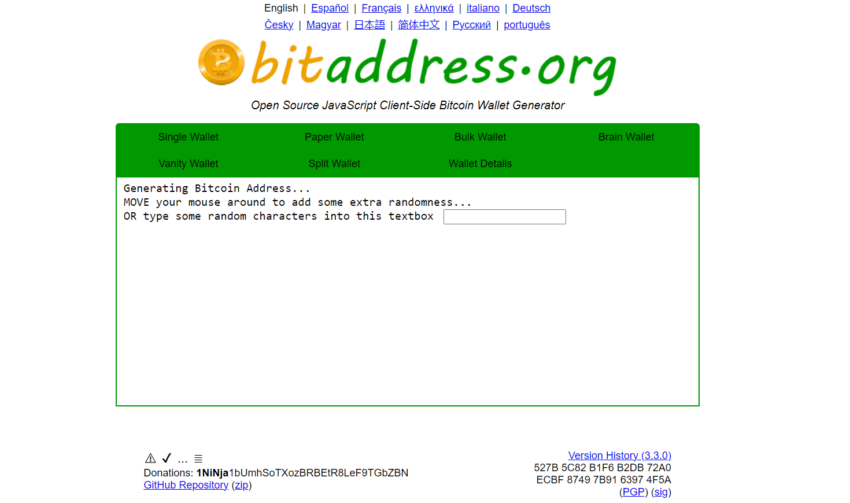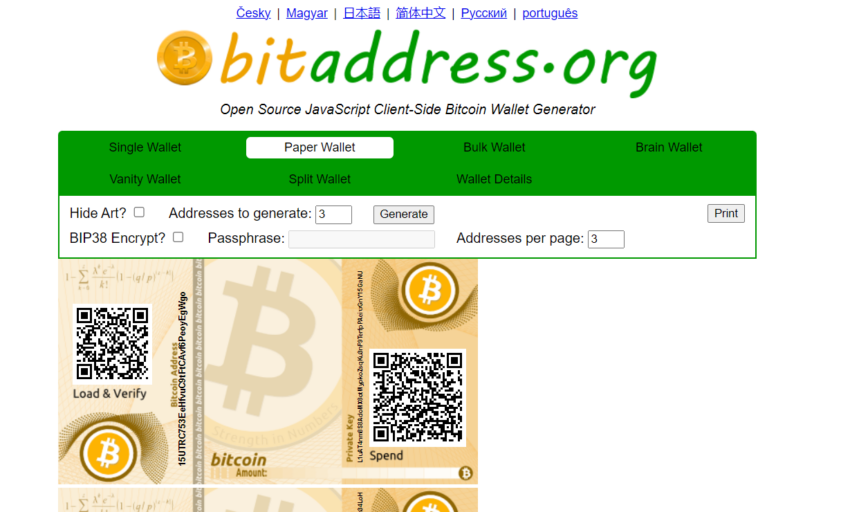

Crypto wallets come in different forms, from mobile wallets to hardware wallets that look like USB sticks. One of the lesser-known (and used) types of crypto wallet is a paper wallet. Read on to learn about crypto paper wallets, how they work, and how to create one.
In this guide:A paper wallet is a physical piece of paper containing a crypto wallet’s private and public keys. Crypto paper wallets contain cryptographic keys in the form of an alphanumeric string or QR code that allows you to store and access Bitcoin (or other crypto) offline.
Paper wallets are considered self-custody cold storage wallets because they store digital assets away from online threats and give users full control over private keys.
Paper wallets gained popularity around 2010 and were considered a foolproof way to store crypto before the advent of hardware wallets. They were recommended as the best way to keep private keys away from online hacks and give users full custody of their digital assets.
The popularity of paper wallets begain to decline around 2016 due to two key concerns. One was the fragility of paper; the other, the lack of a seed phrase to recover funds if you lose the paper.
Moreover, more secure and convenient cold storage options in the form of hardware wallets were developed. In 2024, the hardware wallet market is expanding at pace and is expected to grow at an average CAGR of 31.96% until 2031.

Despite this, paper wallets still exist and represent the most cost-effective cold storage option for crypto investors.
Initially, crypto holders created paper wallets manually by selecting random numbers from rolling dice and writing the generated key sequence on paper with a pen. However, this method was time-consuming and required significant accuracy. These drawbacks led to the development of paper wallet generator apps.

Select “Paper Wallet” and choose the layout of your wallet. Print or manually write down the generated key.

Store the wallet in a secure place. You can laminate it for added longevity. To reduce the chances of online hacks, generate your crypto paper wallet on BitAdress and install a secure operating system like Ubuntu. You can also get a flash drive to transfer the wallet file to the printer.
When creating a paper wallet, you must ensure the generator is open-source, disconnected from the internet, and has an appropriate source of random characters. A bad generator can make predictable character patterns that weaken the security of your private keys. Let’s look at other practices you can apply to your crypto paper wallet to safeguard your assets.
Paper wallets are fragile and prone to degrading and damage from different environmental factors. You can laminate the paper to keep it intact, but you need to do the lamination at home to reduce the chances of exposing your private keys. You can split the paper wallet into parts and store every piece in a different secure location to reduce the chances of theft. The recommended locations to store your paper wallet are safety deposit boxes or fireproof and waterproof safes.
Losing your paper wallet means you lose access to your assets since there is no recovery phrase. You can prevent losing your wallet by making multiple copies and storing them in separate secure locations.
Storing digital assets offline in a cold wallet is one of the safest ways to safeguard your funds. Paper wallets offer a simple and cost-effective way to manage crypto and have a long history in the community.
However, they have drawbacks that make them a somewhat antiquated method of storing assets. Users are adopting more functional and resilient wallets like hardware wallets to keep their assets offline. Crypto paper wallets have faded into the background as more advanced wallets entered the market, but they undoubtedly still serve a purpose when generated securely.
A paper wallet is a self-custody wallet that gives you full control over your crypto. It gives you the responsibility of managing your assets without involving a middleman. You can generate a paper wallet offline, eliminating the risk of cyberattacks and other online threats. A paper wallet that is generated and stored correctly can safely store cryptocurrency for a long time.
Can I store any crypto on a paper wallet?A paper wallet is a piece of paper with a public and private key pair printed or written on it. The public key is an address where the user receives cryptocurrency while a private key is used to authorize transactions and give users access to their funds. A paper wallet can store any crypto.
What is the difference between a paper wallet and a digital wallet?A paper wallet is a piece of paper that holds the private and public key pair, whereas a digital wallet is software that stores your public and private keys. A paper wallet is a cold storage wallet that is completely offline, whereas a digital wallet is connected to the internet for easy access. While paper wallets have no backup when you lose the paper, digital wallets come with recovery phrases that can restore a wallet.
How to use a crypto paper wallet?To use a crypto paper wallet, you need to generate the private and public key pairs and print them on a piece of paper. Some generators offer QR code versions of the keys for ease of use. You can deposit cryptocurrency into the wallet by scanning the public address QR code with compatible software or manually inputting the public address. To spend cryptocurrency, scan the private key with a compatible application and use the software to send your cryptocurrency to the desired address.
Are paper wallets still used?Paper wallets were very popular in the early 2010s but, like most trends in the crypto community, have lost steam in recent years. Although not as popular as before, people are using paper wallets to store cryptocurrency temporarily and give them as gift cards and tips. Paper wallets are a cold storage option with a quick and cost-effective setup process that appeals to many users.
What happens if you lose your paper wallet?Paper wallets only contain the private and public key pair with their respective QR codes. They don’t have a backup, like recovery phrases for software wallets. If you lose your paper wallet and don’t have any other copies, then you permanently lose access to your cryptocurrency.
How to send BTC to a paper wallet?You can send BTC to a paper wallet in two ways: by scanning the public key QR code of the paper wallet using compatible software or manually inputting the public address on the paper wallet into your software. Sending cryptocurrency to a paper wallet works similarly to sending crypto to any other type of wallet.
What is the difference between a hard wallet and a paper wallet?Paper and hardware wallets are both cold storage wallet options, but their differences are in durability, cost, features, and accessibility. Whereas paper wallets are inexpensive to generate, hardware wallets have a high initial cost of purchase. Paper wallets are fragile and susceptible to environmental factors, whereas hardware wallets are designed to be durable, with built-in encryption and support for multiple cryptos.
Can you spend crypto directly from a paper wallet?To spend crypto in a paper wallet, you need to have a compatible software where you can import the private keys. The software will show your balance and give you an option to send your crypto to another address.
What are the alternatives to a paper wallet?Alternatives to a paper wallet include cold storage options like hardware wallets. Hardware wallets are an advanced storage option that keeps your private keys offline with the added advantage of durability. You can also use hot storage options like web3 wallets with the added advantage of ease of use.
What is the main purpose of a paper wallet?The main purpose of a paper wallet is to keep private keys offline and give you full custody over your digital assets. Paper wallets are non-custodial cold storage tools that keep cryptocurrencies away from online threats. When generated offline in a secure environment, paper wallets offer a reliable way of holding digital assets.
Best crypto platforms in Europe | September 2024YouHodler Explore
Wirex App Explore